EMPIRE AND NATION
Partha Chatterjee
Empire and Nation
Selected Essays
with an Introduction by
NIVEDITA MENON
 Columbia University Press New York
Columbia University Press New York
Columbia University Press
cup.columbia.edu
Publishers Since 1893
New York Chichester, West Sussex
Copyright 2010 Partha Chatterjee
All rights reserved
E-ISBN: 978-0-231-52650-0
Library of Congress Cataloging- in- Publication Data
Chatterjee, Partha, 1947
Empire and nation : selected essays / Partha Chatterjee; with an Introduction by Nivedita Menon.
p. cm.
Includes index.
ISBN 978-0-231-15220-4 (cloth : alk. paper)
ISBN 978-0-231-15221-1 (pbk. : alk. paper)
ISBN 978-0-231-52650-0 (ebook)
1. Chatterjee, Partha, 1947 2. Nationalism. 3. Democracy. 4. NationalismIndia. 5. IndiaPolitics and government. I. Title.
JC251.C44 2010
320.954dc22
2010005439
A Columbia University Press E-book.
CUP would be pleased to hear about your reading experience with this e-book at .
References to Internet Web sites (URLs) were accurate at the time of writing. Neither the author nor Columbia University Press is responsible for URLs that may have expired or changed since the manuscript was prepared.
Contents
The essays in this book first appeared in various books and journals, or were given as talks, as listed below. Copyright over them belongs to the author. As a matter of courtesy, the originating publishers whose addresses were available have been informed. Should any omissions in this regard be brought to our notice, they will be rectified in future printings of this book.
PART I: EMPIRE AND NATION
1 Whose Imagined Community?, Millennium, 20, 3 (Winter 1991)
2 The Constitution of Indian Nationalist Discourse, in Bhikhu Parekh and Thomas Pantham, eds, Political Discourse: Explorations in Indian and Western Political Thought (New Delhi: Sage, 1987)
3 History and the Nationalization of Hinduism, Baromas, April 1991 (translated from the Bengali)
4 The Fruits of Macaulays Poison Tree, in Ashok Mitra, ed., The Truth Unites: Essays in Tribute to Samar Sen (Calcutta: Subarnarekha, 1985)
5 Of Diaries, Delirium and Discourse, Biblio, August 1996
6 The Nationalist Resolution of the Womens Question, in Kumkum Sangari and Sudesh Vaid, eds, Recasting Women (New Delhi: Kali for Women, 1989)
7 Our Modernity, Srijnan Haldar Memorial Lecture, 1994 (translated from the Bengali)
8 A Tribute to the Master (unpublished)
9 Those Fond Memories of the Raj, Times of India, 20 July 2005
10 Beyond the Nation? Or Within? Economic and Political Weekly, 32, 12 (411 January 1997)
PART II: DEMOCRACY
11 Democracy and the Violence of the State: A Political Negotiation of Death, Inter-Asia Cultural Studies, 2, 1 (2001)
12 Secularism and Toleration, Economic and Political Weekly, 29, 28 (9 July 1994)
13 Satanic? Or the Surrender of the Modern?, Ananda Bazar Patrika, 27 October 1988 (translated from the Bengali)
14 Development Planning and the Indian State, in Terence J. Byres, ed., The State and Development Planning in India (Delhi: Oxford University Press, 1998)
15 We Have Heard This Before, Ananda Bazar Patrika, 14 September 1990 (translated from the Bengali)
PART III: CAPITAL AND COMMUNITY
16 A Response to Taylors Modes of Civil Society , Public Culture, 3, 1 (Fall 1990)
17 A Brief History of Subaltern Studies, in Gautam Bhadra and Partha Chatterjee, eds, Nimnabarger Itihas (Calcutta: Ananda, 1998), translated from the Bengali
18 The Colonial State and Peasant Resistance in Bengal, 19201947, Past and Present, 110 (February 1986)
19 On Religious and Linguistic Nationalisms: The Second Partition of Bengal, in Peter van der Veer and Hartmut Lehmann, eds, Nation and Religion: Perspectives on Europe and Asia (Princeton: Princeton University Press, 1999)
As the old joke goes:
Why did the chicken cross the road?
Karl Marx: Given the material stage of development of the road, it was a historical inevitability.
Jacques Derrida: Any number of contending discourses construct the meaning of that act and the authorial intention can never be discerned, because the Author is DEAD, DAMMIT, DEAD!
T o introduce a set of essays that one has not selected is to risk misreading the curatorial intention. Nevertheless, secure in the knowledge that Author/Curator is dead-dammit-dead, I draw my legitimacy from the simple fact that I am one of those whose engagement with the contemporary has been utterly transfigured by reading Partha Chatterjees work over the years.
The reader familiar with his work should know that this collection is a new arrangement of some of his essential writings. It is also not surprising, for anyone who has followed Chatterjees slow building up of arguments over the years, to find here earlier versions of some of the most influential of such conceptual innovations as have now passed into common shorthandour modernity, the inner/outer in nationalist thought, and the dyad of civil society/modernity, political society/ democracy.
What this collection of essays does, then, is to set some of Chatterjees key writings within the framework of Empire and Nation, thus enabling a particular counternarrative of modernity to emergenot an alternative modernity nor a non-modernity (both terms leaving untouched European modernity as the norm)but rather, an account that reveals both our modernity as well as European modernity to be particular cases of a general history of modernity.
Modernity: Consumers and Producers
In an interview a few years ago, Chatterjee said that he comes to Western social theory at a tangent:
there was a time early in my career when I probably would have said that if one was approaching political theory, one should approach it irrespective of ones cultural or geographical location I am far more aware now of the ways in which my location in India influences the questions about politics and society that seem more urgent In trying to approach those concerns, I often find myself in a position of relative remoteness from the body of Western social theories Even when Western social theory approaches these issues, it actually misrepresents, often misidentifies, the problem
The theory that will explain Indian democracy or the theory that will explain Chinas capitalism today will actually be a far more general theory of which Western theory will just be a particular case.
Chatterjee began his travels in theory from the late 1970s when, as a young Marxist, he was armed with certainty and the confidence to advance on behalf of a class, an alliance or the people as a whole, a rival claim to rule. Today he is certain only of his scepticism of utopias, even while his central concern remains the samethe politics of the governed. For many who came to scholarship in the 1990s, in a period already deeply marked by the tracks of such troubled journeysthose of Chatterjee of course, but also of Ashis Nandy and writers in the early Subaltern Studies volumes (Susie Tharu, Sudipta Kaviraj, and Dipesh Chakrabarty in particular)there was never that moment of innocence, the assumption that one could approach political theory irrespective of ones cultural or geographical location.
Chatterjees work foregrounds the question of location, a move that has been often misunderstood to mean something like indigenism, as for example when Sarah Joseph, terming Chatterjee and Nandy critics of modernity,
However, when Chatterjee invokes location it is not about India versus the West (with the imputation of greater authenticity to the Indian side of the equation); nor does he frame the question within the tradition/modernity framework, and certainly not in terms of persistence of the traditional. The idea of persistence assumes a teleological journey from traditional to modern, an assumption alien to Chatterjee. His project, rather, is to map the various formations of modernity in most of the world, thus showing both Europe and us to be particular cases of a general history.
Next page
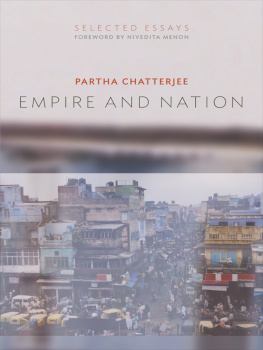
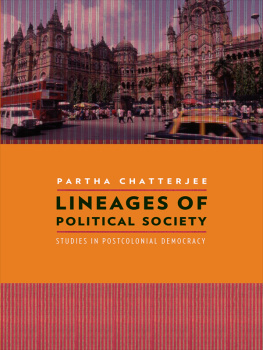

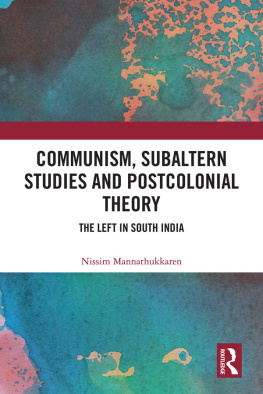
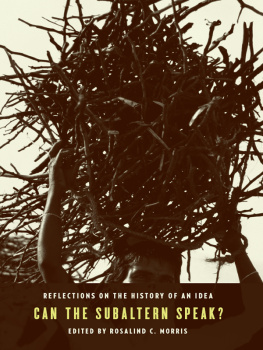
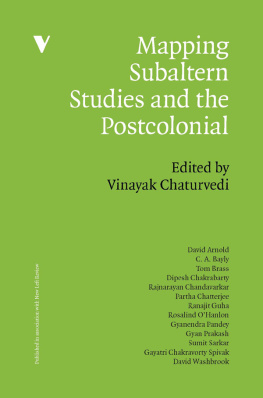
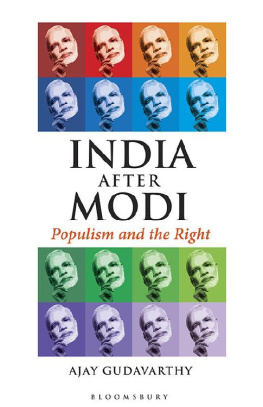
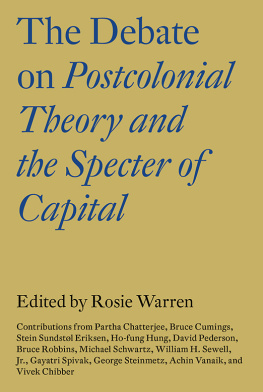
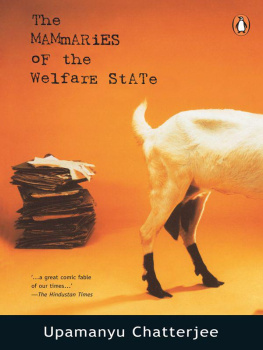
 Columbia University Press New York
Columbia University Press New York